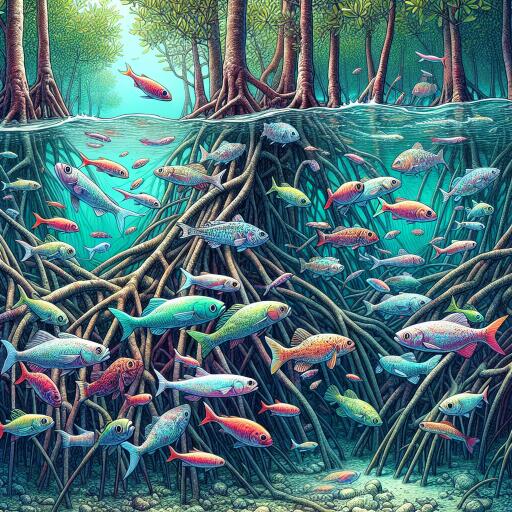
Preserving Mangroves is Essential for Juvenile Fish
Mangrove ecosystems in Belize play a critical role as nurturing grounds for juvenile fish, underpinning marine biodiversity and supporting local fisheries. These coastal habitats, often referred to as the “nurseries of the sea,” offer shelter and nutrition for young fish species, ensuring their survival and growth before they venture into open waters as mature fish. The intricate root structures of mangroves provide a sanctuary from predators while maintaining abundant feeding opportunities.
Current efforts underscore the importance of these ecosystems. An initiative named “Mangrove Habitat for Juvenile Fish Recruitment: Building Local Knowledge and Capacity,” has been launched to improve community understanding of mangrove systems. Its goal is to provide communities with the knowledge and tools needed to protect and restore the mangroves in Belize and their essential role in the recruitment of fish populations.
This endeavor is supported by financial aid from the Sustainable Blue Economies Programme, which aims at enhancing sustainable fisheries management in light of the decline in mangrove areas over recent decades. The program empowers local communities and fishermen to gather valuable data that is crucial for the sustainable management of Belize’s valuable mangrove environments and the juvenile fish residing within them.
Key stakeholders like independent scientist Guadalope “Valentine” Rosado have been pivotal in these efforts. With over a decade of experience in mangrove restoration, Rosado has engaged in projects across various nations, including Aruba and Costa Rica. He uses a technique called Rem-Mangroves, where mangroves are cultivated within special encasements, granting them the possibility to establish in high-wave locales more efficiently than they would in natural conditions.
Rosado elaborated on restoration strategies underway in San Pedro, highlighting the integration of mangrove planting as part of the town’s beach restoration plan. “While primarily a long-term strategy, introducing smaller mangrove plants is expected to contribute significantly to beach stability in the short term,” said Rosado. The team has earmarked specific sites suitable for such planting, preparing to receive their first allotment of encasements soon.
The initial focus will be on the area around the seawall by the bridge. Over ensuing years, the growth of mangroves will lead to the systematic removal of the seawall, allowing nature to take precedence. Once established, the mangroves are expected to inject greenery, offering habitats for fish and sanctuaries for various bird species.
Protecting and revitalizing mangrove ecosystems should be a priority to bolster their resilience against environmental stresses. Research demonstrates that robust mangrove areas correspond with elevated fish stock levels, advocating the implementation of conservation strategies. Therefore, preserving Belize’s mangrove regions is vital for promoting juvenile fish recruitment and sustaining marine health.
These habitats face threats from coastal development and shifting climate patterns. The degradation of mangrove environments jeopardizes marine biodiversity and the livelihoods of the Belizean population reliant on the fishing industry. Recent losses of mangrove areas, notably in Ambergris Caye, are attributed to developmental pressures from tourism and real estate.
Authorities such as the Belize Forest Department stipulate that property owners intending to alter mangroves need to obtain specialized permits. There are often significant challenges in ensuring compliance with these regulations, leading to illegal mangrove cutting. This is a serious threat as mangroves are an integral component of healthy marine ecosystems.
Residents, particularly on islands like Caye Caulker and Ambergris Caye, are urged to adhere to proper application processes before making any alterations to mangroves. Non-compliance may attract fines and penalties from environmental agencies. Commitment to legal and sustainable practices will protect these vital natural resources for future generations.





Leave a Reply